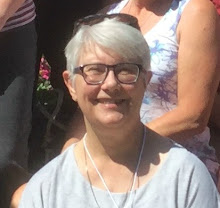Sunrise today didn't look much different, and the one minute change in when it happened doesn't seem like much. But, it's a new day, a new trip around the sun.
This morning someone referred to weaving language as 'weavespeak' and I think I'm stealing that.
Weaving has been happening since the dawn of time and the language of weaving has evolved over that time until it really has become a language of its own. It is also a language that has been stolen in order to provide words for other, newer technologies such that if you ask a child what a 'shuttle' is, it won't likely be anything to do with weaving. Or if you ask a young person what a 'thread' is, you are likely to be told it is a thread of conversation on the internet. And so on.
One of the first things I do when teaching people how to weave is hand them a list of words that they will need to know in order to aide communication. One of the first things I tell the Olds students is that they need to learn how to spell those words. It's 'sley' not slay or sleigh. It's 'dye' not die. I do blame auto correct for much of the typos, but it is something to be aware of because exchanging those words will not lead to effective communication. Especially the dye/die exchange. (I have a story, best told in person.)
Weavers (and spinners and felters/knitters/crocheters/lacemakers etc) need to be able to communicate with each other in writing because much of our communication in the 21st century is done on line, in writing. While context will generally give the meaning, it is still important (imho) that we maintain the lines of communication to reduce confusion. New weavers may have only heard the words, so the more experienced amongst us need to set the example (again imho).
If anyone is to refer to themselves as a 'master' weaver, clear communication should be routine.
There are other crafts where I have heard the words, but really have no idea how to spell them. But I don't claim to be a master carpenter. When someone refers to a kurf/curf/kerf I know what they mean when I hear the word. But I'm not trying to write about woodworking. While I knit, I haven't followed a pattern in decades and frankly? I'm not sure I could now, not without spending time figuring out the 'code' of how to abbreviate what needs to happen.
And that's the thing. For any craft we want to learn, the very first thing that we need to do is learn the language of that craft. We need to read the beginning bits in the books to find out what the code is that is the short hand notation of what would take a lot more words to convey than that short hand notation.
As we head into the depths of winter, rest assured that the sun is returning. We are heading into a new year. There are still challenges ahead of us but we have to be adaptable. When we make plans, it is always good to have back up plans in place. If the bridge on the road ahead falls down, we may need to detour. Flexibility. I think that is probably going to be the word we need for 2021.
Stay safe. Stay well. Stay covid aware.




5 comments:
Great reminders, all. I love language and particularly the languages of the arts and crafts and trades. They're so eloquent, and beautiful. The right tool for the sentence.
I hate to disappoint you but although sunset is very slowly getting later now (since the 14th), sunrise goes on being later after the solstice. Today (in BC) until the 26th it is 8:38 and then 8:39 from 27th to the 30th. From the 31st you can start looking for half a minute earlier a day and by the 10th a whole minute as it speeds up until the Spring equinox in March.
Yuletide greetings from the UK.
Since I am actually aware of this, I am not disappointed. The fact remains the solstice has arrived and a new trip around the sun begins.
Irony: using aide (noun) instead of aid (verb) in a sentence about correct spelling.
Sigh. Typos happen. I’m not immune. :(.
Post a Comment